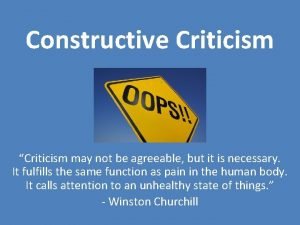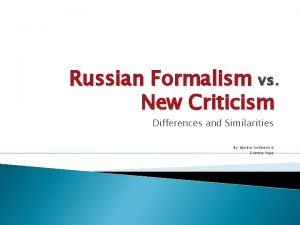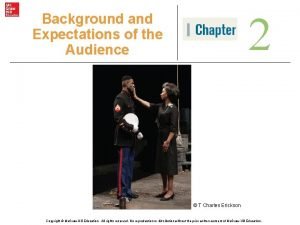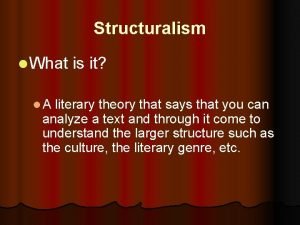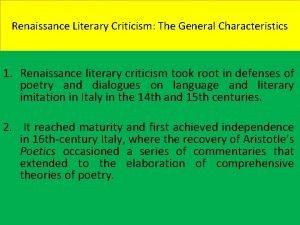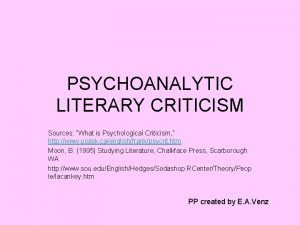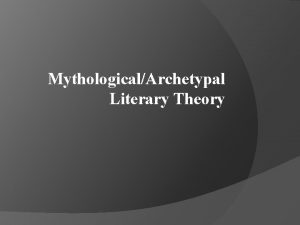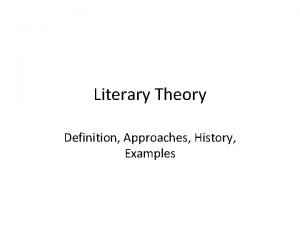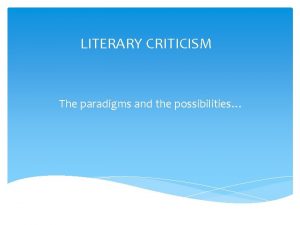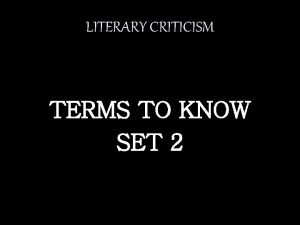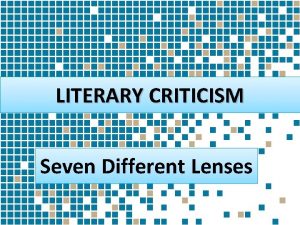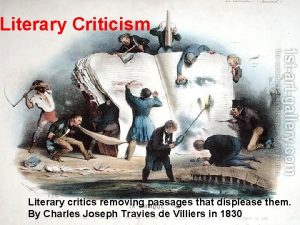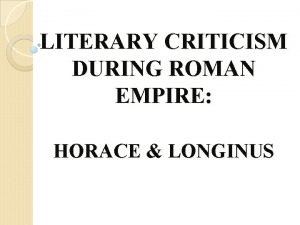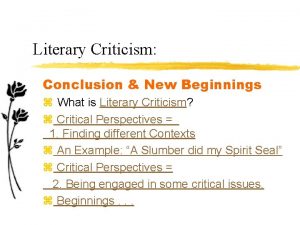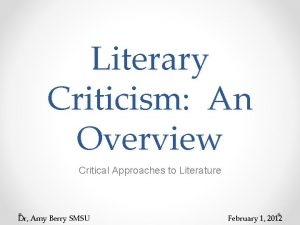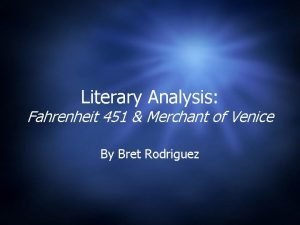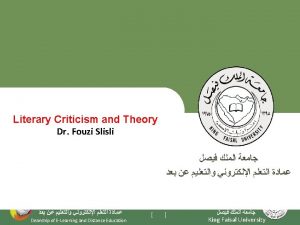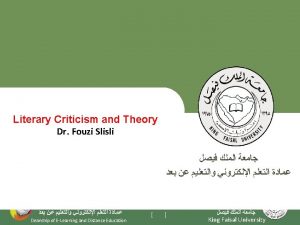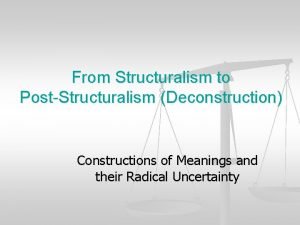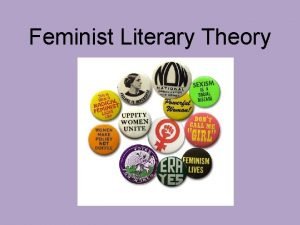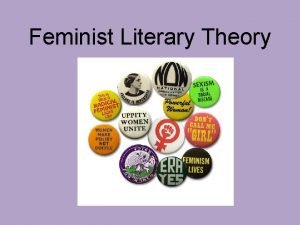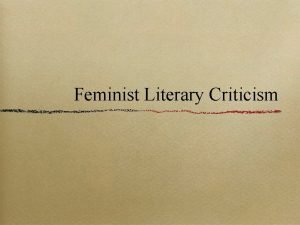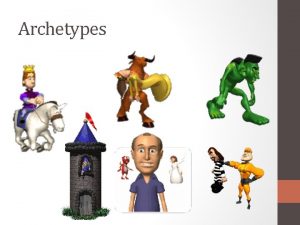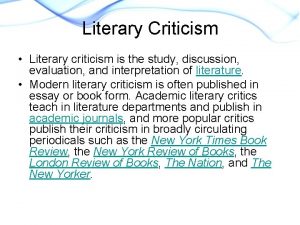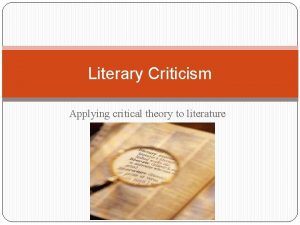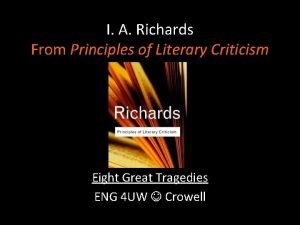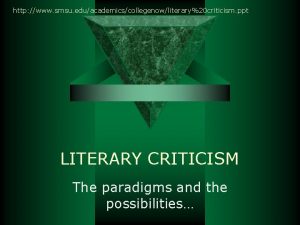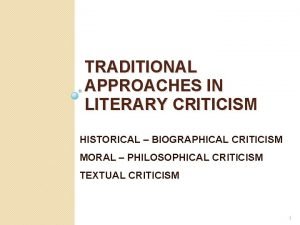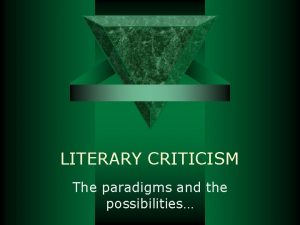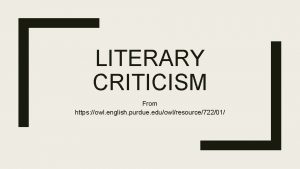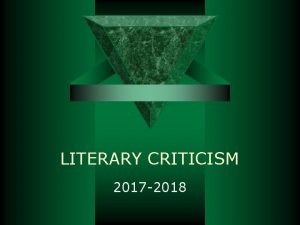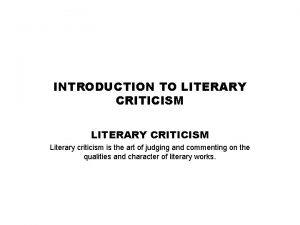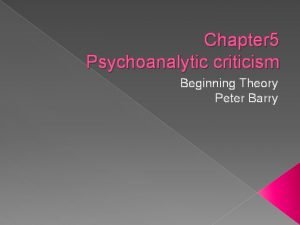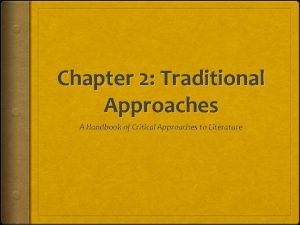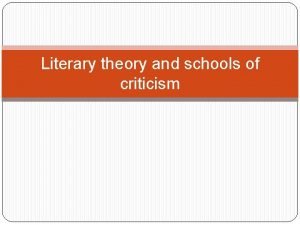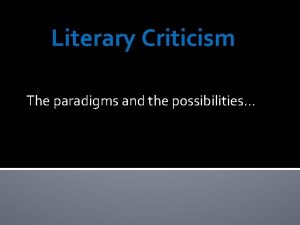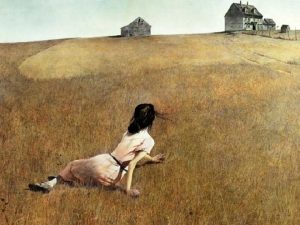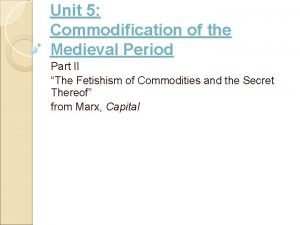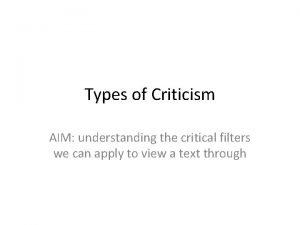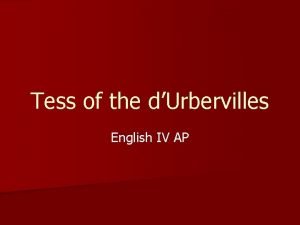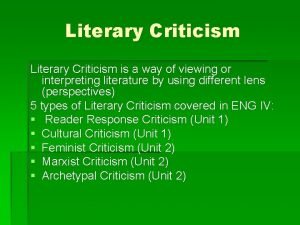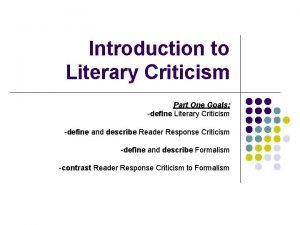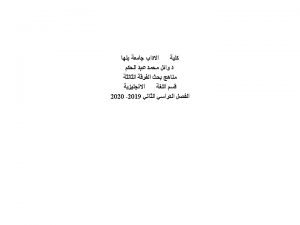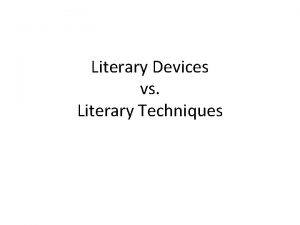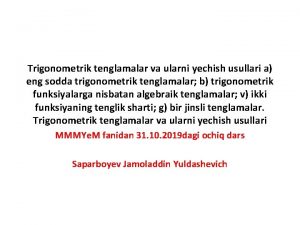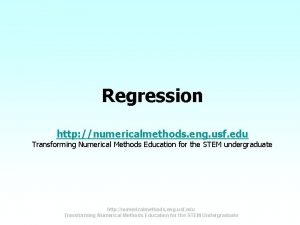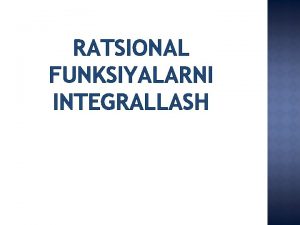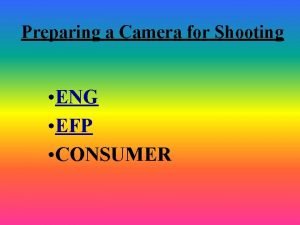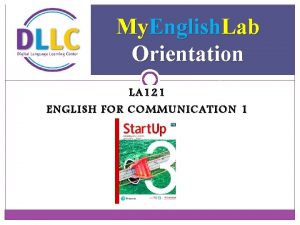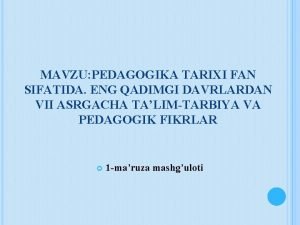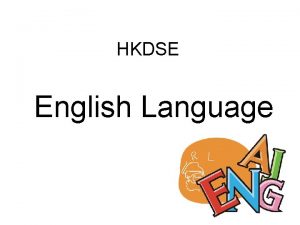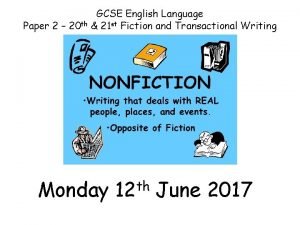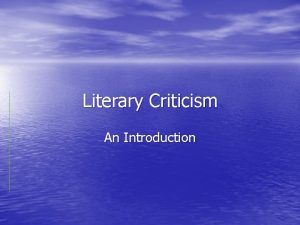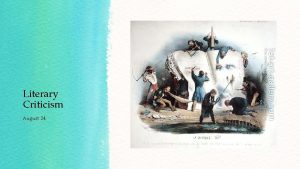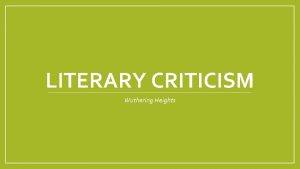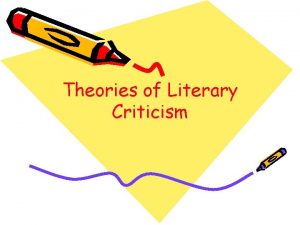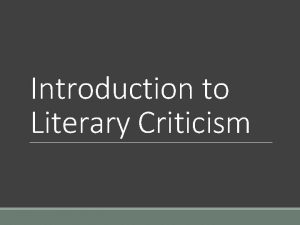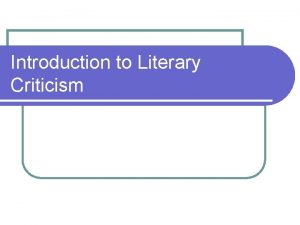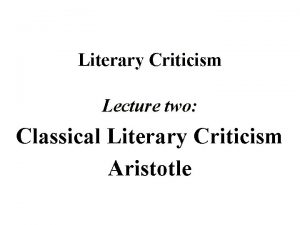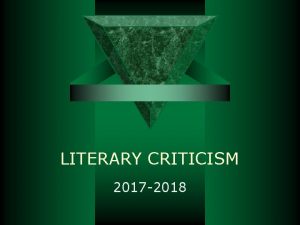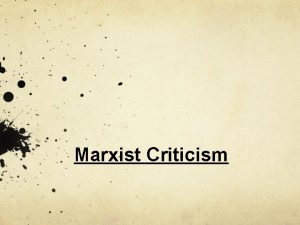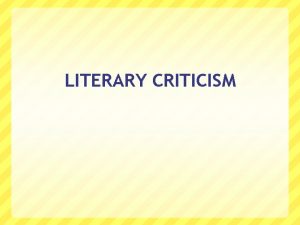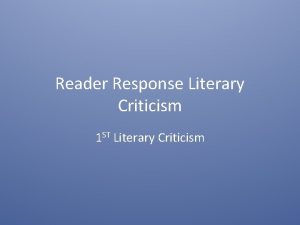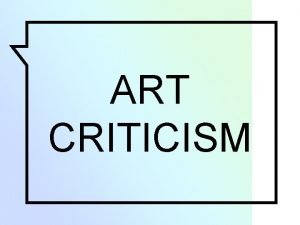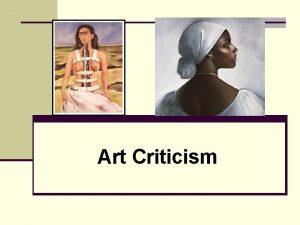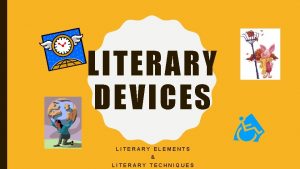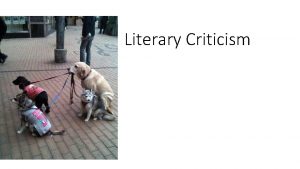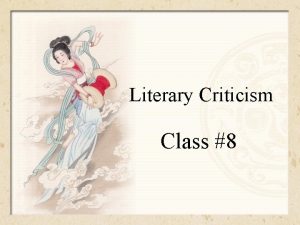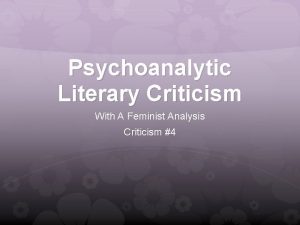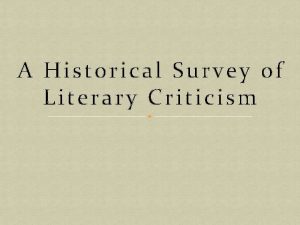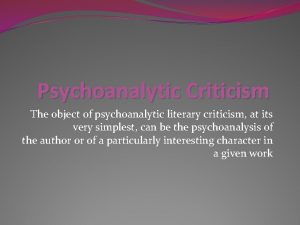Introduction to Literary Criticism ENG 4 UI l
























































- Slides: 56

Introduction to Literary Criticism ENG 4 UI

l Can you read this man’s mind?

l How about this man’s?

l Or this woman’s?

The old way l This was the old way of reading l Authors were seen as sole proprietors of the meaning of their writing l Readers took it at face value

Romanticism l centered on the artist and creative genius l text was indebted to previous writers and ideas l the power of the natural world

Romanticism centered on the artist and creative genius text was indebted to previous writers and ideas The power of the natural world


Realism lart should replicate the world around us lliterature represents the times it is written



Modernism loverturn traditional modes of representation and express the new sensibilities of their time lthe Artist as savior l"irrationality at the roots of a supposedly rational world“ Michel-André Bossy




Postmodernism l resist definition or classification l the artist is impotent, and the only recourse against "ruin" is to play within the chaos l death of the author





Literary Criticism and Theory l Any piece of text can be read with a number of different sets of “glasses, ” meaning you are looking for different things within the text l Literary Criticism helps readers understand a text in relation to the author, culture, and other texts

The Most Common Critical Stances for Literature l Formalistic l Marxist l Feminist/Gender l Psychological l Archetypical l Biographical l Historical/Cultural l Deconstructionist

What is theory? l Interdisciplinary l Speculative l Thinking about thinking

The Author is Dead l The reader's role: active agent who imparts "real existence“ to the work and completes its meaning through interpretation

Questioning? l Dispute “common sense” meanings l Literary theory suggests that we cannot know what the writer “had in mind” l The text holds no “truths” l Instead there are various ways of reading a text and interpreting a text l Be suspicious of that which we find “natural”


Your Assignment l At the end of the unit, you will choose one of the four main theories we look at and apply this theory to a children’s story l We will use “The Three Little Pigs” as a an example throughout this unit

Formalist Criticism A formalist (aka New Criticism) reading of a text focuses on symbol, metaphor, imagery, and so on l Formalism ignores the author’s biography and focuses only on the interaction of literary elements within the text l It’s what you do most often in English literature l

A Formalist Reading of “The Three Little Pigs” l What does the wolf symbolize? l Notice the consonance of “I’ll huff and I’ll puff…” l How does the story foreshadow the final fate of the pigs? l What does the wolf’s dialogue tell us about his character?

Marxist Criticism Capitalism is a social system based on the principle of individual rights and means of production are privately owned l Key points l exploitation of an entire class of society by another l the ruling class controls the means of production l Subjectification of working class l

Questions Marxist theorists ask… l l l l Whom does it benefit if the work or effort is accepted/successful/believed, etc. ? What is the social class of the author? Which class does the work claim to represent? What values does it reinforce? What values does it subvert? What conflict can be seen between the values the work champions and those it portrays? What social classes do the characters represent? How do characters from different classes interact or conflict?

The Hunger Games l How would a Marxist view these novels/films?

“The Three Little Pigs” l How would a Marxist look at this story? l How could we alter this story to demonstrate our understanding of the Marxist theory?

Gender Criticism l Gender criticism analyzes literature through the lens of socially-constructed gender roles l The largest part of gender criticism is feminism, which critiques and seeks to correct women’s subordination to men in society l In its purist form, feminism is about equality

Gender Criticism: Feminism l Belief in the social, political, and economic equality of the sexes l An example of a marginalized group’s attempt to reappropriate meaning

l Concerned with the ways in which literature reinforces or undermines the economic, political, social, and psychological oppression of women l Inherently patriarchal


Patriarchal ideology is the primary means by which women are politically, economically, psychologically or socially oppressed l Women as “other”: she is marginalized, defined only by her difference from male norms and values l All of western (Anglo-European) civilization is deeply rooted in patriarchal ideology, for example, in the biblical portrayal of Eve as the origin of sin in the world l Biology determines our sex (male or female); culture determines our gender (masculine or feminine) l

Questions Feminist theorists ask… l l l l l How is the relationship between men and women portrayed? What are the power relationships between men and women (or characters assuming male/female roles)? How are male and female roles defined? What constitutes masculinity and femininity? How do characters embody these traits? Do characters take on traits from opposite genders? How so? How does this change others’ reactions to them? What does the work reveal about the operations (economically, politically, socially, or psychologically) of patriarchy? What does the work imply about the possibilities of sisterhood as a mode of resisting patriarchy? What does the history of the work's reception by the public and by the critics tell us about the operation of patriarchy? What role does the work play in terms of women's literary history and literary tradition?

Gender Criticism: Queer Theory l A newer segment of gender criticism is “queer theory, ” which looks for the influence of homosexuality within texts l Research of this type is fairly difficult because, as you’ve learned, homosexuality was largely suppressed in Europe and America, and it hasn’t been openly discussed until the last few decades

Gender Studies/Queer Theory l l l l What elements of the text can be perceived as being masculine (active, powerful) and feminine (passive, marginalized) and how do the characters support these traditional roles? What sort of support (if any) is given to elements or characters who question the masculine/feminine binary? What happens to those elements/characters? What elements in the text exist in the middle, between the perceived masculine/feminine binary? In other words, what elements exhibit traits of both (bisexual)? What are the politics (ideological agendas) of specific gay, lesbian, or queer works, and how are those politics revealed in. . . the work's thematic content or portrayals of its characters? What does the work contribute to our knowledge of queer, gay, or lesbian experience and history, including literary history? How is queer, gay, or lesbian experience coded in texts that are by writers who are apparently homosexual? What does the work reveal about the operations (socially, politically, psychologically) homophobic? How does the literary text illustrate the problems of sexuality and sexual "identity”?


“The Three Little Pigs” l How would a Gender theorist look at this story? l How could we alter this story to demonstrate our understanding of the Gender theory?

Psychological Criticism l Psychological critical theory applies theories of psychology to a text to better understand its characters l Based largely on Freud, this theory hinges on an examination of people’s (characters’) unconscious desires

Psychological Criticism l Drives governing human behaviour l l l Id – the animal nature that says, “Do what feels good. ” Ego – the reality-based part of your personality that makes decisions to satisfy the Id and Superego – the socialized “conscience” that tells you what’s right or fair

Psychological Criticism Oedipus Complex – Every boy has the unconscious desire to have sex with his mother; consequently, sons are deeply afraid of their fathers, and fathers are deeply threatened by their sons. Elektra Complex – Every daughter has the unconscious desire to have sex with her father; consequently, daughters are deeply afraid of their mothers, and mothers are deeply threatened by their daughters.

Psychological Criticism Of course, these complexes have their origins in literature and mythology l Psychological criticism is a way to understand characters, not diagnose them l

Questions Psycho-analytical theorists ask… l l l How do the operations of repression structure or inform the work? Are there any oedipal dynamics - or any other family dynamics - at work here? How can characters' behaviour, narrative events, and/or images be explained in terms of psychoanalytic concepts of any kind (for example. . . fear or fascination with death, sexuality - which includes love and romance as well as sexual behaviour - as a primary indicator of psychological identity or the operations of ego-id-superego)? What does the work suggest about the psychological being of its author? What might a given interpretation of a literary work suggest about the psychological motives of the reader? Are there prominent words in the piece that could have different or hidden meanings? Could there be a subconscious reason for the author using these "problem words"?

A Psychological Reading of Macbeth l Macbeth kills King Duncan because he unconsciously recognizes the king as a father-figure. Hence, Duncan is a rival for power and the affections of the people. l In the latter acts of the play, Macbeth has indulged his id so often that his ego has lost the ability to restrain it.

“The Three Little Pigs” l How would a Psychoanalyst look at this story? l How could we alter this story to demonstrate our understanding of the Psychological theory?

Archetypical Criticism l This stance is not about mythology l It is about the universal elements of human life common in all cultures l Like ancient mythology, all literature is a window to creating meaning for human life l In other words, stories make us feel like our lives are more significant

Archetypical Criticism Central to the Archetypical theory is the concept of archetypes l Simply put, archetypes are those universal elements present in the literature of all cultures l

Archetypical Criticism l Common Archetypes The Hero = Beowulf, Spiderman, Luke Skywalker, Braveheart l The Outcast = Macbeth’s clown, Grendel, Cain l The Quest = LOTR, Star Wars, Beowulf l Sacrificial King = Jesus, The Lion the Witch and the Wardrobe, LOTR l Evil Personified = Wicked Witch of the West, the Devil, the Emperor in SW, the Borg l

Archetypical Criticism l The goal of Archetypical Criticism seeks to understand how the story constructs meaning in the human existence through archetypes

“The Three Little Pigs” l How would an Archetypical theorist look at this story? l How could we alter this story to demonstrate our understanding of the Archtypical theory?

More Literary Theory l New ways of viewing literature (and the world) continue to develop, but these are the main theories you’ll come in contact with
 Ekstremumlar
Ekstremumlar Two types of historical criticism
Two types of historical criticism What is constructive criticism
What is constructive criticism What is the difference between new criticism and formalism
What is the difference between new criticism and formalism Descriptive criticism vs prescriptive criticism
Descriptive criticism vs prescriptive criticism Example of structuralism
Example of structuralism Literary criticism in the renaissance
Literary criticism in the renaissance Psychological criticism literary theory
Psychological criticism literary theory Archetypal/mythological literary theory
Archetypal/mythological literary theory Literary criticism example
Literary criticism example Marxist criticism definition
Marxist criticism definition Periods of literary criticism
Periods of literary criticism Criticism lenses
Criticism lenses Archetypal literary criticism
Archetypal literary criticism Horace and longinus as classical critics
Horace and longinus as classical critics Conclusion of new criticism
Conclusion of new criticism Approaches to literary criticism
Approaches to literary criticism Sociological criticism definition
Sociological criticism definition Literary analysis on fahrenheit 451
Literary analysis on fahrenheit 451 Structuralism literary criticism
Structuralism literary criticism What is post structuralism in literary criticism
What is post structuralism in literary criticism Poststructuralism meaning
Poststructuralism meaning Falocentrista
Falocentrista Feminist literary criticism
Feminist literary criticism Feminist literary criticism ppt
Feminist literary criticism ppt Critical lenses in literature
Critical lenses in literature Character color archetypes
Character color archetypes 8 literary approaches
8 literary approaches What is a critical lens
What is a critical lens Ia richards principles of literary criticism
Ia richards principles of literary criticism Literary approaches
Literary approaches Historical/biographical criticism
Historical/biographical criticism Literary approaches
Literary approaches Purdue literary theory
Purdue literary theory What is structuralist formalist
What is structuralist formalist Advantages and disadvantages of literary criticism
Advantages and disadvantages of literary criticism Psychoanalytic criticism ppt
Psychoanalytic criticism ppt A handbook of critical approaches to literature
A handbook of critical approaches to literature Structuralism theory in literature
Structuralism theory in literature Literary criticism map
Literary criticism map Literary criticism map
Literary criticism map Example of marxism
Example of marxism Types of literary criticism
Types of literary criticism Tess of the d urbervilles literary criticism
Tess of the d urbervilles literary criticism Reader response criticism cinderella
Reader response criticism cinderella Types of literary criticism
Types of literary criticism Owl purdue subject verb agreement
Owl purdue subject verb agreement Literary device vs literary technique
Literary device vs literary technique Ferrari usuli
Ferrari usuli Http://numericalmethods.eng.usf.edu
Http://numericalmethods.eng.usf.edu Kasr ratsional funksiyalarni integrallash
Kasr ratsional funksiyalarni integrallash Eng camera definition
Eng camera definition My english lab
My english lab Qushlarning rivojlanishi
Qushlarning rivojlanishi Avestoda ta'lim tarbiyaga oid fikrlar ppt
Avestoda ta'lim tarbiyaga oid fikrlar ppt English dse weighting
English dse weighting Edexcel gcse english language paper 2
Edexcel gcse english language paper 2


